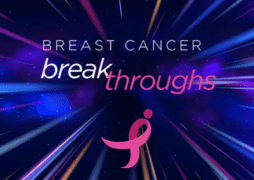It takes the average American about 26 minutes to commute to work. In that short time, it is estimated that two people in the U.S. will lose their lives to breast cancer. That’s about 115 families every day that lose a mom or dad or daughter or sister. Countless moments, big and small, that shape us, guide us — all lost. That’s unacceptable!
This year alone, more than 42,000 people in the U.S. will lose their lives to breast cancer. That’s like a sold-out major league baseball stadium disappearing — every year. Many of those deaths are due to metastatic breast cancer (MBC), also known as stage IV breast cancer, which is incurable.
Metastatic breast cancer is breast cancer that has spread beyond the breast to other organs in the body, most often the bones, lungs, liver and/or brain. This is the stage of breast cancer that most often kills the people we love — people like my mom. Today, more than 154,000 women and an untold number of men in the U.S. are living with metastatic breast cancer, waiting for a cure — and we must make conquering metastatic breast cancer a national priority for them.
To help fuel this commitment, we’re establishing an MBC Fund specifically designed to spur scientific discoveries and support those living with MBC. All donations, and 100 percent of the proceeds of this fund will go to supporting people living with MBC, as well as MBC research. We can and we must continue to discover ways to improve the quality of life for those living with metastatic breast cancer, as well as discover new, more effective treatments that will prolong their lives, so they have more time with the ones they love.
We’re proud that we’ve invested more than $210 million in metastatic breast cancer research. Yet we’re not content. Metastasis has been and will continue to be our top research priority. Metastatic breast cancer research has grown to represent 70% of Komen’s total annual research investment — up from 50% just two years ago. And, for the past two years, we have prioritized our competitive research grants program to focus on MBC. This will continue.
This year, we are focused on redefining metastatic breast cancer through liquid biopsy. We believe that by using a sample of blood to detect cancer cells, or pieces of DNA from tumor cells that are circulating in the blood stream, we have the potential to predict treatment response and guide precision medicine. Yet more research is needed before it can become common practice in the diagnosis and treatment of breast cancer. Ultimately, we envision a day where doctors can use a small sample of blood to detect metastatic disease even before symptoms arise, monitor treatment response in real time, and develop a more personalized treatment plan for metastatic breast cancer patients. Both early detection of metastatic disease and quickly understanding if a treatment is effective or not will be key factors toward improving outcomes. Quick and responsive treatments are vital for patients with metastatic disease to ensure they find the therapy that works for their individual disease.
Our work doesn’t stop with research. We also need to help those living with metastatic breast cancer today live better lives, longer. That means providing resources and support for people living with metastatic breast cancer and their families. We currently do this through a variety of patient-centered services. More than 700 people living with metastatic breast cancer received support from a trained specialist or social worker through Komen’s Breast Care and Clinical Trial Information Helplines last year, and more than 900 received financial assistance through Komen’s Treatment Assistance Program. Anyone in need of these services can call 1-877 GO KOMEN (1-877-465-6636).
It also means hosting educational events for patients and their families through our MBC Impact Series. These events connect people with the latest research from leading experts and information to improve quality of life. We hosted 26 events across the country last year. Many were also live streamed, so that people could benefit regardless of their ability to travel. We have more than 55 events planned over the next year.
It is also important to connect with women and men who have completed treatment for early stage breast cancer, to educate them about the risks of recurrence and potential warning signs and symptoms that their breast cancer has returned. This information can be critical in empowering them to advocate for themselves with their health care teams when their gut says something is wrong.
Finally, to make this a national priority we must also mobilize advocates across the country to support more government research funding, as well as federal and state legislation that would remove barriers to care, particularly for those living with MBC. For example, we need to ensure metastatic patients are able to receive the treatments they require without being forced into bankruptcy or faced with rules that only serve to delay care.
As the leading non-profit funder of breast cancer research, with more than $1 billion invested since our founding, we are committed to doing everything we can to create a future where no one loses someone they love to breast cancer. This means we also advocate for compassionate public policy, we offer financial support through our patient treatment assistance and we provide a range of patient support services — including transportation and childcare — ensuring patient support every step of the way. We are committed to alleviating the suffering of those facing the disease now, while we tirelessly search for tomorrow’s cures.”
We’re asking everyone with the power to make a difference to join us. Together, we must do whatever it takes to change the story of metastatic breast cancer — for those living with it today and for the future.
*This article originally appeared in USA Today in partnership with Brandpoint.



